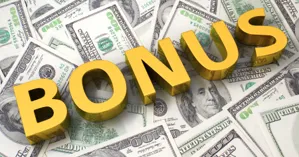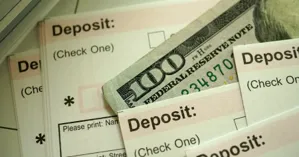- Quick Summary
- What Types of Bank Account Bonuses are Available?
- How do Bank Bonuses Work with Direct Deposit?
- Why Do Banks Offer Sign-up Bonuses?
- Top Bank Account Bonus Offers Currently
- Drawbacks to Checking Account Bonuses
- Maximizing Your Bank Account Bonus
- Tax Implications of Bank Account Bonuses
- Common Mistakes to Avoid
- Is a Bank’s Sign Up Bonus Worth It?
- Conclusion

- Quick Summary
- What Types of Bank Account Bonuses are Available?
- How do Bank Bonuses Work with Direct Deposit?
- Why Do Banks Offer Sign-up Bonuses?
- Top Bank Account Bonus Offers Currently
- Drawbacks to Checking Account Bonuses
- Maximizing Your Bank Account Bonus
- Tax Implications of Bank Account Bonuses
- Common Mistakes to Avoid
- Is a Bank’s Sign Up Bonus Worth It?
- Conclusion
You've probably seen banks advertise bonuses if you move your accounts to them. This immediate extra cash sounds excellent, but there's a lot to consider before leaving your current bank or credit union. But free cash sounds good. How do you get free cash bonuses by switching accounts?
What Types of Bank Account Bonuses are Available?

Cash bonuses and promotional interest rates are offered by some banks for opening accounts. Many banks offer a checking account bonus as an incentive for new customers. For example, Citi Bank offers $325 for new eligible checking accounts with direct deposit.
Wells Fargo offers a $300 bonus with a minimum opening deposit of $25 when you open an Everyday Checking account. Some banks also offer bonuses for opening a business checking account, which can be beneficial for small business owners.
These sign up bonuses are designed to attract new customers and can be a great way to earn extra cash.
How do Bank Bonuses Work with Direct Deposit?

Think of a credit card welcome bonus, which is meant to incentivize customers to open an account. They can come in the form of cash or promotional annual percentage yield (APY). The APY is usually higher than normal and is for a limited time.
Bonuses are earned by following the bank’s rules and requirements. Once you fulfill these, the money is sent to your account.
For example, some requirements ask that you set up a qualifying direct deposit. Others require a minimum account balance or maintain a specified average daily balance. You may only need to be a new customer who has never banked with them before opening the account.
Why Do Banks Offer Sign-up Bonuses?

Banks offer sign-up bonuses to attract new customers and encourage them to open a new checking or savings account. These bonuses can be a one-time payment or a series of payments made over a certain period. By offering sign-up bonuses, banks aim to increase their customer base, boost deposits, and ultimately drive revenue growth. Additionally, sign-up bonuses can help banks differentiate themselves from competitors and build brand loyalty.
Top Bank Account Bonus Offers Currently
Several banks offer attractive sign-up bonuses for new customers. Some of the top bank account bonus offers include:
- Chase Bank: Up to $3,000 bonus for opening a new Chase Private Client Checking account.
- Citibank: Up to $1,500 bonus for opening a new checking account.
- Huntington National Bank: Up to $600 bonus for opening a new checking account.
- BMO: Up to $300 bonus for opening a new Smart Advantage Checking account.
- Fifth Third Bank: $400 bonus for opening a new Momentum Checking or Preferred Checking account.
These offers are subject to change and may have specific requirements, such as minimum opening deposits, direct deposits, or maintaining certain account balances.
Drawbacks to Checking Account Bonuses

You’ll have to jump through hoops to get most bonuses, especially during the account opening process. There are often one or more qualifying activities. And they are usually difficult to achieve.
The biggest checking account bonuses have the toughest requirements. One requirement could be a significant deposit and balance.
Bank fees may cancel out the bonus. Many banks charge fees for their checking. If you only pay attention to the bonus, you may not notice the extra monthly charges.
Fees could include:
- not meeting a minimum balance
- monthly service fee
- receiving a direct deposit
You could also incur a fee for closing the account too soon after opening it.
Maximizing Your Bank Account Bonus
To maximize your bank account bonus, follow these tips:
- Read the fine print: Understand the terms and conditions of the bonus offer, including any requirements or restrictions.
- Meet the requirements: Ensure you meet the minimum opening deposit, direct deposit, or account balance requirements to qualify for the bonus.
- Keep the account open: Maintain the account for the required period to receive the bonus.
- Monitor your account: Keep track of your account activity and ensure you meet the bonus requirements.
- Consider multiple accounts: If you have multiple accounts with the same bank, consider consolidating them to maximize your bonus earnings.
Tax Implications of Bank Account Bonuses
Bank account bonuses are considered taxable income and must be reported on your tax return. The IRS requires banks to send a Form 1099-INT or Form 1099-MISC for bonuses over $10. You may need to pay taxes on your bonus, depending on your tax bracket. It’s essential to set aside a portion of your bonus for taxes to avoid any unexpected tax liabilities.
Common Mistakes to Avoid
When pursuing bank account bonuses, avoid the following common mistakes:
- Not reading the fine print: Failing to understand the terms and conditions of the bonus offer can lead to missed opportunities or unexpected fees.
- Not meeting the requirements: Failing to meet the minimum opening deposit, direct deposit, or account balance requirements can disqualify you from receiving the bonus.
- Closing the account too soon: Closing the account before the required period can result in forfeiting the bonus.
- Not monitoring your account: Failing to track your account activity can lead to missed bonus opportunities or unexpected fees.
- Not considering tax implications: Failing to set aside a portion of your bonus for taxes can result in unexpected tax liabilities.
Is a Bank’s Sign Up Bonus Worth It?

Some people move their money around to constantly receive bank bonuses. They have no intention of staying with the bank long-term. But it doesn’t always pay off, and it’s important to do the math before opening a new account.
Consider the opportunity to deposit your money into high-yield savings accounts rather than chase bonuses. Online banks are popular because of their high APY. Banks like Ally or SoFi are known for generous interest rates.
Some banks offer a Perks Checking account that provides additional benefits and bonuses. For higher earners, the Platinum Perks Checking account can offer even more substantial bonuses.
And once more, fees could diminish any bonus that you receive.
If the account suits your needs after all this and you can easily meet the requirements, consider moving your money and earning the bonus.
Conclusion
The trend is for banks to offer bonuses for opening new accounts. However, in order to receive these bonuses, there are usually several stipulations. Do the math and see if it’s really worth chasing the bonus.



